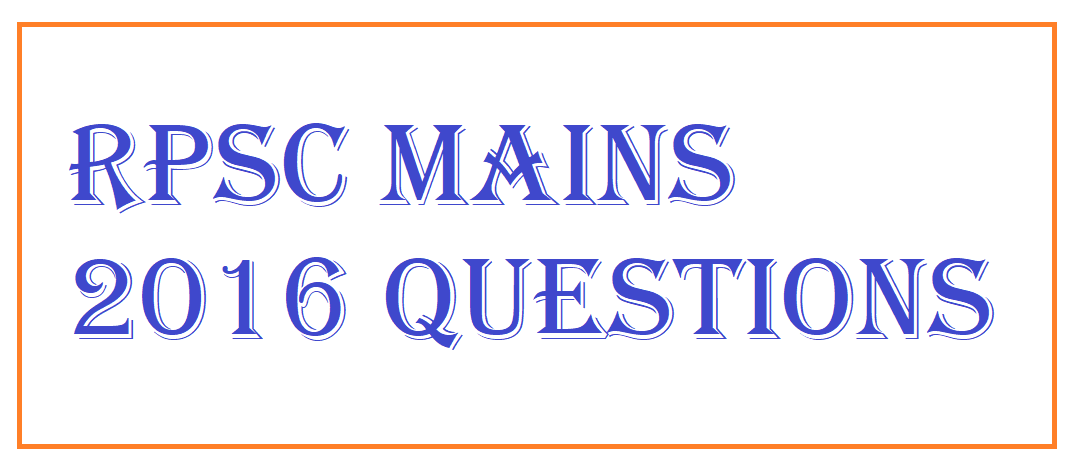
☰
RPSC Mains 2016 GS Paper 3 Questions
RPSC Mains 2016 GS Paper 3 Questions to boost YourSelf study.

Unit-I (75 Marks)
Part-A (Marks: 10)
- What is the constitutional status of 'Right to Property' in India?
- What is the relevance of 'Yekaterinburg Summit'?
- Enumerate the four grounds on which a member of Union Public Service Commission can be removed by the President of India.
- Explain the phenomenon of 'Politicisation of castes' in Rajasthan.
- Explain the relevance of G-20.
Part-B (Marks: 25)
- Discuss the major functions of Niti Aayog.
- What are the criteria for recognizing a political party as a National Political Party?
- What are the challenges confronting the SAARC at present?
- Discuss India's response to China's activities in the South China Sea.
- Point out the major recommendations of Punchi Commission.
Part-C (Marks: 40)
- What are the major features of Paris Agreement (COP 21) of the United Nations' framework convention on climate change?
- Discuss the significance of the landmark judgement of Supreme Court of 1997 regarding gender justice.
- Discuss the phenomenon of stabilisation of 'Two Party System' in the politics of Rajasthan since 1998.
- What are the important recommendations regarding electoral reforms in the 255th Report of the Law Commission of India?
Unit-II (65 Marks)
Part-A (Marks: 10)
- What is the purpose of writ of Habeas Corpus?
- What do you mean by Generalist Administrator?
- What do you understand by politico-administration dichotomy?
- Point out any two differences between authority and power.
- Write any two functions of State Secretariat.
Part-B (Marks: 25)
- Enumerate four basic features of New Public Administration.
- Explain the discretionary powers of the Governor.
- Write any five functions of Lok-Ayukta.
- Distinguish between Development Administration and Administrative Development.
- 'Grass-root unit of administration is Patwari'. Comment.
Part-C (Marks: 30)
- Critically examine the role of District Collector in District Administration.
- Point out the role of Chief Secretary in State Administration.
- Trace the evaluation of Public Administration as an independent academic discipline.
Unit-III (Section - A) (20 Marks)
Part-A (Marks: 10)
- Write the name of 'Cardinal Virtues' of Plato.
- What is the meaning of 'Utilitarianism' according to J.S. Mill?
- What is the concept of 'Naturalistic Fallacy'?
- Define 'Swadharma' according to Geeta.
- Explain the meaning of 'Categorical Imperatives' according to Kant.
Part-B (Marks: 10)
- Describe the notion of 'Niskamakarmayoga' according to Geeta.
- Explain the postulates of morality according to Kant.
Unit-III (Section - B) (20 Marks)
Part-A (Marks: 10)
- What is Social Intelligence?
- Describe Allport's definition of Personality.
- What do you understand by Retroactive Inhibition?
- What is Stress?
- Define Ebbingaus Curve.
Part-B (Marks: 10)
- How Semi projective techniques are useful to assess personality?
- Analyse different ways of Coping for stress management.
Unit-III (Section - C) (20 Marks)
Part-A (Marks: 10)
- State Salmon's definition of ownership.
- Who are entitled to seek information under the Right to Information Act, 2005?
- What is the definition of 'child' under the protection of women from Domestic Violence Act, 2005?
- Define 'Nazul Land' under the Rajasthan Law Revenue Act, 1956.
- What are the kinds of 'Person' under law.
Part-B (Marks: 10)
- What are the 'Primary Rights' of tenants under the Rajasthan Tenancy Act, 1955?
- What do you mean by 'Hacking with Computer System'?